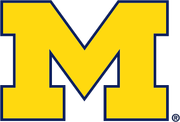
Record: 5-6-1
Series Record: 3-3-1
Saturday November 24
Last Meeting:
March 23, 2012
Michigan was rumored to be the only team that could challenge Boston College for the national championship last season. That was until the Wolverines had the misfortune of being seeded first in the Midwest Regional to face Cornell. The Wolverine fanbase and blogosphere was not overtly disrespectful or arrogant regarding its chances against Cornell. But, then again, they were. When the first puck dropped, their arrogance seemed to be supported when Michigan nearly leapt to a 2-0 lead in the opening two minutes of the 2012 NCAA Midwest Regional Semifinal. Luke Glendening and Kevin Lynch appeared to score goals in those first two minutes. However, the latter goal was waived ultimately for goaltender interference. The resulting dynamic of the game changed.
Coach Schafer refocused his team with a well-planned timeout. Current-captain Erik Axell led the first shift after the disallowed goal and brought back a sense of confidence to the game. Cornell left the period knotted with the Wolverines with one goal each after Michigan native John McCarron scored a beautiful goal from the face-off circle that beat Hobey Baker Finalist goaltender Shawn Hunwick. The drama of the game would increase only from there.
Cornell played nearly twelve minutes of the game down a man. It killed off all of those opportunities, including several minutes of 5-on-3 play in Michigan's favor. Cornell would convert one of its penalty kill opportunities into a short-handed goal as Joakim Ryan scored 40 seconds into the second period. Locke Jillson would be awarded a penalty shot, but after a late goal from Kevin Lynch, the game would be decided in overtime. A defensive breakdown for Michigan and a well-executed play from Mowrey, Miller, and Craig resulted in Roger Craig tallying his second career goal and his second game-winning goal of his career to eliminate Michigan from the 2012 NCAA Tournament.
This Season:
Michigan is off to a much slower start than it had hoped. If one were to identify the singular reason why, it is goaltending. The Wolverines are suffering from a hangover after losing walk-on and Michigan-record-setting goaltender Shawn Hunwick. Michigan's defense was not as disciplined as Berenson would have hoped last season, but with an elite goaltender between the pipes, this blemish on Michigan's resume was not as apparent last season.
The Wolverines now rely upon a rotation of freshmen Jared Rutledge and Steve Racine. The former was the goaltender whom the Michigan staff, including Berenson, touted as the Wolverines's most likely starter. His on-ice performance has been less-than-stellar. Rutledge started in net for the Wolverines in their first NCAA Division I game of the season. He allowed the RIT Tigers five goals and a victory. At Yost. The RIT Tigers have done their part to make that victory seem worse as they have amassed a record of 2-7-1.
Rutledge has played in four games. He has won one and produced a goals against average of 0.855 and a save percentage of 4.46. His counterpart, Racine, has started the remainder of the games earning the remaining four victories for the Wolverines on the season. His numbers are less than overwhelming as well at a goals against average of 2.69 and a save percentage of 0.889.
Poor goaltending statistics like that are exacerbated by lackluster defense, especially when compared to the standards that are expected of a Berenson Michigan team. Michigan outranks only seven programs in NCAA Division I men's ice hockey in terms of defensive efficiency. Those seven programs this season include five Atlantic Hockey programs (American International, Army, Bentley, RIT, and Sacred Heart) and Alabama-Huntsville. The Wolverines average an allowance of 3.33 goals per game for their opponents.
Michigan players were awarded six points against Cornell. Five of the six point-earners will be on the roster during the Frozen Apple at Madison Square Garden. This is how this Michigan team has found success this season. Overwhelming offense. The Wolverines rank sixth in the national in terms of offensive productivity. "The Champions of the West" generate 3.58 goals per game.
The Wolverines's offensive onslaught is led by many of the same talents that Cornell kept largely silent last year in the 2012 NCAA Midwest Regional including A. J. Treais who leads the team in goals and points with nine and 14 respectively, Alex Guptill, Mac Bennett, and Kevin Lynch. These players are joined by new, but no less dangerous, talents like Jacob Trouba and "Boo" Nieves, who is an Upstate New Yorker, as the top-six point producers for the Wolverines.
The Wolverines have not lost when they have scored three goals or more. Four of Michigan's five victories have come with the Wolverines scoring four goals.
Keys to the Game:
Comparison of special teams leads to mixed results. Michigan converts on only 16.7% of its man-advantage opportunities. Cornell converts much closer to 18% at a rate of 17.9%. Cornell and Michigan differ in their rate of penalty kill by exactly 1.0% in favor of the Wolverines at 82.6%. Neither set of data is what is expected with the level of each program. These data seem to indicate that the special-teams battle will be awash. Some have highlighted it as what will decide the game Saturday evening. I doubt think the recent performance of either team indicates that.
Cornell would win easily a special-teams battle if it returns to the power-play form that it had during the Colorado-College series and maintains its disciplined penalty killing of last weekend. This Cornell teams have shown glimmers of brilliance in its special teams during given weekends. Meanwhile, Michigan has earned its numbers with relatively mediocre consistency.
The game that will develop likely is one that resembles the clash between a Michigan team that produces 3.58 goals per game with a goaltending tandem that generates a combined save percentage of 0.876 and allows 3.30 goals, and a Cornell team that surrenders a stingy total of only 2.38 goals per game and Andy Iles who generates a save percentage of 0.923 and averages allowing only 2.09 goals.
The Frozen Apple will pit one of the most prolific offenses to date in Michigan against one of the historically defensive powers of college hockey in Cornell. Cornell can win this battle. In fact, one could argue that it has already. Cornell swept handedly Colorado College. The Tigers are more prolific than the Wolverines. It has been done and can be done. Michigan, however, has tallied two of its wins against two of the seven programs defensively less sound than it is. Miami is the only program that the Wolverines have defeated, in a series split, that has registered defensive numbers on the same relative plane as Cornell defense so far this season.
Cornell needs to score more than one goal. This is a strategic and psychological necessity. A mental block has begun to form in the team's mindset as Cornell has not scored more than one goal since the game against Princeton. Quinnipiac, Harvard, and Dartmouth both held the Big Red to a lone goal. Let's hope that the bright lights of Lynah Southeast buoy the team and its many offensive talents to capitalize on the offense that they produce like we know that they can.
Historical Dimension:
Some Michigan fans place the Wolverines on a pedestal as superior to all other collegiate hockey programs. Historically, this is defensible and largely true. It is true that the Wolverines have won more NCAA national titles than any other program. Michigan is an amazing program and is my second-favorite historical program in college hockey.
However, let's take a look at the claims of the lovers of winged helmets in comparison to the success of Cornell. Cornell and Michigan both have won two NCAA national titles since Lyndon Johnson was inaugurated for a full term as president of the United States. The vast majority, 78%, of Michigan's total of national championships were won before the Wolverines played in Yost Ice Arena. Michigan earned only four more Frozen-Four appearances than Cornell over the same span. Michigan's 12 Frozen-Four appearances over that span is tied with Harvard's 12 Frozen-Four appearances.
The fanbases of the two programs that will take the ice at Madison Square Garden Saturday are regarded generally as the two best in college hockey. The Lynah Faithful and the Children of Yost have no peers. I find the former to be more to my liking, but the zeal of the latter cannot be denied. The support of these fanbases have led to each program having remarkable success at their home venues.
Lynah and Yost in the college hockey world are synonymous with intimidation and greatness. Cornell played its first game at Lynah Rink in 1958. Michigan hockey moved into Yost Ice Arena in 1973. Both programs have entered elite ranks as they have earned more than 500 wins in their home venues. Michigan has won 530 games at Yost. The Big Red has won 513 games at Lynah Rink. It is evident why Michigan, a program that refuses to travel to the home venues of East-Coast-based programs, is fearful of venturing to Lynah Rink on East Hill. However, I doubt that the Wolverines will find the confines of Lynah Southeast at The Garden to be any less hostile.
Cornell and Michigan are among the greatest programs in college hockey. Arguably, they are the greatest. I assume if you are a reader of WAFT that you are quite familiar with the history of the former program. If you have the time before Saturday's game, I would suggest that you consider watching a well-produced and interesting documentary on the history of Michigan hockey. Cornell reminded the Wolverines "overtime was the place where Michigan hockey hopes went to die" in the 2012 Midwest Regional Semifinal.



 RSS Feed
RSS Feed
